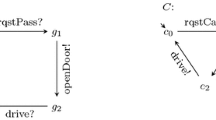Abstract
Interface automata are one of the prominent formalisms for specifying interface behaviors of component-based systems. However, only one-to-one communication is allowed in the composition of interface automata. This paper presents multicast interface automata which generalize the classic interface automata and accommodate multicast communication mechanism. The multicast interface automata endorse both bottom-up and top-down design methodologies. Theoretical results on compatibility and refinement are established for incremental design and independent implementability.
Similar content being viewed by others
Explore related subjects
Discover the latest articles and news from researchers in related subjects, suggested using machine learning.References
Alfaro L D, Henzinger T A. Interface automata. In: Proceedings of the 8th European Software Engineering Conference Held Jointly with 9th ACM SIGSOFT International Symposium on Foundations of Software Engineering. 2001, 109–120
Alfaro L D, Henzinger T A. Interface-based design. Engineering Theories of Software-intensive Systems, 2005, 195: 83–104
Lynch N A, Tuttle M R. Hierarchical correctness proofs for distributed algorithms. In: Proceedings of the 6th Annual ACM Symposium on Principles of Distributed Computing. 1987, 137–151
Lynch N A, Tuttle M R. An introduction to input/output automata. CWI-Quarterly, 1989, 2(3): 219–246
Lynch N A. Distributed Algorithms. Morgan Kaufmann Publishers, San Mateo, CA, 1996.
Kaynar D K, Lynch N A, Segala R, Vaandrager F. Timed I/O automata: a mathematical framework for modeling and analyzing realtime systems. In: Proceedings of the 24th IEEE Real-Time Systems Symposium. 2003, 166–177
Kaynar D K, Lynch N A, Segala R, Vaandrager F. The theory of timed I/O automata. Synthesis Lectures on Computer Science, 2006, 1(1): 1–114
Wu S H, Smolka S A, Stark E W. Composition and behaviors of probabilistic I/O automata. Theoretical Computer Science, 1997, 176(1–2): 1–38
Stark E W, Smolka S A. Compositional analysis of expected delays in networks of probabilistic I/O automata. In: Proceedings of the 13th Annual IEEE Symposium on Logic in Computer Science. 1998, 466–477
Stark E W, Cleaveland R, Smolka S A. A process-algebraic language for probabilistic I/O automata. Lecture Notes in Computer Science, 2003, 2761: 193–207
Lynch N A, Segala R, Vaandrager FW. Hybrid I/O automata. Information and Computation, 2003, 185(1): 105–157
Alfaro L D, Henzinger T A. Interface theories for component based design. Lecture Notes in Computer Science, 2001, 2211: 148–165
Wen Y J, Wang J, Qi Z C. Bridging refinement of interface automata to forward simulation of I/O automata. In: Proceedings of the 6th International Conference on Formal Engineering Methods. 2004, 259–273
Wen Y J, Wang J, Qi Z C. 2/3 alternating simulation between interface automata. In: Proceedings of 7th International Conference on Formal Engineering Methods. 2005, 173–187.
Chakrabarti A, Alfaro L D, Henzinger T A, Jurdzinski M, Mang F Y C. Interface compatibility checking for software modules. Lecture Notes in Computer Science, 2002, 2404: 428–441
Chakrabarti A, Alfaro L D, Henzinger T A, Mang F Y C. Synchronous and bidirectional component interfaces. Lecture Notes in Computer Science, 2002, 2404: 414–427
Alfaro L D, Henzinger T A, Stoelinga M. Timed interfaces. Lecture Notes in Computer Science, 2002, 2491: 108–122
Chakrabarti A, Alfaro L D, Henzinger T A, Stoelinga M. Resource interfaces. Lecture Notes in Computer Science, 2003, 2855: 117–133
Alfaro L D, Silva L D D, Faella M, Legay A, Roy P, Sorea M. Sociable interfaces. Lecture Notes in Computer Science, 2005, 3717: 81–105
Alur R, Henzinger T A, Kupferman O, Vardi M. Alternating refinement relations. Lecture Notes in Computer Science, 1998, 1466: 163–178
Author information
Authors and Affiliations
Corresponding author
Additional information
Fei He received the BS degree from National University of Defense Technology in 2002, and the PhD degree from Tsinghua University in 2008. He is currently an associate professor in the School of Software at Tsinghua University, Beijing, China. His research interests include satisfiability, model checking, compositional reasoning, and their applications to embedded systems.
Xiaoyu Song received the PhD degree from the University of Pisa, Italy in 1991. From 1992 to 1999, he was on the faculty at the University of Montreal, Canada. In 1998, he worked as a senior technical staff in Cadence, San Jose. In 1999, he joined the faculty at Portland State University. He is currently a professor in the Department of Electrical & Computer Engineering at Portland State University, Portland. His current research interests include formal methods, design automation, embedded system design, and emerging technologies. He has been awarded as the Intel Faculty Fellow during 2000–2005. He served as an associate editor of IEEE Transactions on Circuits and Systems and IEEE Transactions on VLSI Systems.
Ming Gu received the BS degree in computer science from National University of Defence Technology, Changsha, China in 1984, and the MS degree in computer science from the Chinese Academy of Science at Shengyang in 1986. Since 1993, she has been working as a lectuer/associate professor/researcher in Tsinghua University. Her research interests include formal methods, middleware technology, and distributed applications.
Jiaguang Sun received the BS degree in automation science from Tsinghua University in 1970. He is currently a professor in Tsinghua University. He is an expert in computer graphics, computer-aided design, formal verification of software, software engineering, and system architecture. He was elected to the Chinese Academy of Engineering in 1999. He is currently serving as the dean of the School of Information Science & Technology in Tsinghua University, and the director of the National Laboratory for Information Science & Technology.
Rights and permissions
About this article
Cite this article
He, F., Song, X., Gu, M. et al. Generalized interface automata with multicast synchronization. Front. Comput. Sci. 9, 1–14 (2015). https://doi.org/10.1007/s11704-014-4016-7
Received:
Accepted:
Published:
Issue Date:
DOI: https://doi.org/10.1007/s11704-014-4016-7




